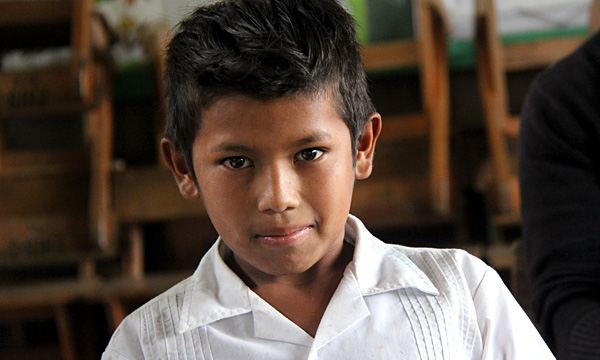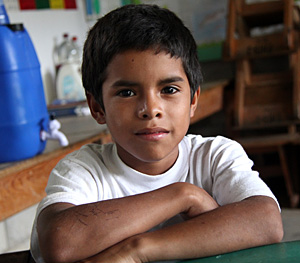

Media CenterSimple Needs: Food, Water and Education in Honduras
 Elmer Pineda attends Justo P. Henriquez, a school that benefits from the "Food for Education” program led by Catholic Relief Services and local authorities. Through the incentive of school meals, Elmer and more than 50,000 children haveaccess to better education, transportation, security patrols and mentoring. Photo by Christian López Meléndez/CRS
Elmer Pineda attends Justo P. Henriquez, a school that benefits from the "Food for Education” program led by Catholic Relief Services and local authorities. Through the incentive of school meals, Elmer and more than 50,000 children haveaccess to better education, transportation, security patrols and mentoring. Photo by Christian López Meléndez/CRS

By Christian Meléndez López
Edgar Mendoza and Elmer Pineda stand out in my memory. At 12 years of age, they were about to graduate from the elementary school where they shared their love for mathematics. The soon-to-be graduates told me about their school, Justo P. Henríquez Primary School, a humble campus at the top of a mountain in northern Honduras. I asked them if they were best buddies, and they just giggled, nodding yes!
The school site can be described quickly: three small classrooms, a kitchen, and newly built latrines —separate for boys and girls— built by the community. There are 57 students and three teachers, including the principal. Each teacher supervises three grades in a single classroom.
As part of their day, students receive a merienda — a light, midday meal that, in some cases, may constitute half of the child’s total daily nutrition in this part of the country. During my time at the school, the mothers of two of the students were already preparing the day’s fare. They told me how important it is to partner with the feeding program administrators, as their children benefit holistically — in terms of both education and health.
The Henríquez school, since 18 months ago, is one of 1,047 schools where Catholic Relief Services and local authorities implemented the $17.7 million Food for Education (FFE) program, with funding from the U.S. Department of Agriculture. Through the incentive of school meals, Edgar, Elmer and 52,449 additional children have access to a better quality of education, improving literacy, attendance and retention.
 Edgar and his brothers walked several miles three times a day to reach the nearest well. Thanks to the CRS program, access to water in schools and homes is now attainable. Photo by Christian López Meléndez/CRS
Edgar and his brothers walked several miles three times a day to reach the nearest well. Thanks to the CRS program, access to water in schools and homes is now attainable. Photo by Christian López Meléndez/CRS

Every time I look at images of Edgar and Elmer, I am reminded that a part of my heart was left there the day of my visit. Edgar and Elmer are sharp, candid and caring children with very simple needs, but grand goals in life. I especially remember when they told me how much they would like to have running water in their school and homes. Edgar mentioned how he and his siblings would walk miles to get to the nearest well three times a day.
Like I said, simple needs: water.
CRS and the municipality supported the boys’ community of El Planón to construct a water and sanitation system. This project helped the entire community come together. And now, they are confidently working on other projects to improve their communal interests.
To date, the Food for Education Program has increased academic achievement by 20% in some schools. The program has removed barriers to improved attendance for children in 17 municipalities in the department (state) of Intibucá, serving 7,867,650 school meals daily and providing a dry ration that students with regular attendance can take home.
The program even provided a new blackboard for the kindergarten classroom.
Simple needs.
Christian Meléndez López is the editor and producer of CRS' Spanish-language website, crsespañol. She is based in Baltimore, MD.

